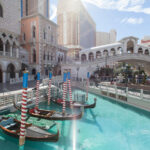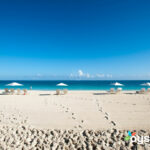
When my patio door flew off, I knew it was all over.
First, it felt like a game. I dutifully stocked up on bottled water and canned ham, latched my hurricane shutters, and remembered all of those evening newscasts I watched about folks in the tropics nailing plywood over their windows while I was in snowy Minnesota. I never thought I’d be one of them, but in September, I temporarily moved to Tortola in the British Virgin Islands. Hurricane Irma was a 200-mile-per-hour bullet coming to kill me, and I was armorless and alone.
Like many visitors, I came here hoping to luxuriate in the baths of idyllic Virgin Gorda, to down Painkiller cocktails at the clubs on Jost Van Dyke, to charter catamarans at the Bitter End Yacht Club, and to rent snorkels and submerge myself in the exquisite, peaceful blue water of the Caribbean.

Of course, tourism is just one pillar of the BVI’s economy. The other one is international — some say offshore — financial services. Americans, Brits, and Canadians come here to sail, paddle board, drink heavily, and make gobs of money. I’d hoped, for a time, to be one of them.
I chose my temporary lodging on a cliffside atop Joe’s Hill for its stunning, glittering view of Road Town. On hurricane day, I casually camped out in my living room, and hoped to watch Netflix until the power went out. However, around 11 a.m., I no longer saw anything outside my window. I realized my idyllic cliffside perch offered no protection from the wrath of Irma, which, the last time I got any news, was being called the strongest hurricane ever recorded in the Atlantic. As my candles went out and my hurricane shutters banged deafeningly against the wall, I realized this wasn’t a game anymore.
I stood in the middle of the living room, paralyzed, as the shutters rattled and then, to my horror, flew off completely. I reasoned with myself, believing I wasn’t really in trouble unless the doors flew open.
A second later, they did just that.

I knew I had to act. Trying to close the doors, though, would mean rushing into the pulsing, gaping maw of Irma. Instead, I gathered up my paltry collection of electronics and valuables and skedaddled to the bathroom, which is situated between two solid concrete walls. It was the safest space I had, and I’d hoped I wouldn’t have to use it. I curled up on a cushion next to my toilet, shoved in earplugs to cover the sound of Irma’s screaming, and shuddered with every crash and bang. I pictured the chaos swirling outside the door, shielded from it by just three inches of wood. Was that a tree? My TV? My roof?
Three hours later, to my astonishment, the winds died down, and I heard shouting. It was my downstairs neighbor, Rocky. He was there with Mozelle, my other neighbor. They saw my smashed-open door, couldn’t find me, and thought the worst. I emerged from my bathroom and we rushed outside. I’d been afraid the door would fly off its hinges, but that’s not what happened. The door itself had literally broken in two, and remained a crumpled wreck on my patio. My walls were covered in shredded leaf pulp. Glass shards sparkled up from my living room floor — the byproduct of a mango branch that smashed one of the panes asunder. My TV was face down on the couch, my dining room chairs were in my front yard, and my curtains were sodden lumps. Half my windows were gone, and I couldn’t find my baseball cap anywhere. But what made me panic the most was the fact that I had carelessly left two diamond studs on my bedside table. They were part of the inheritance from my late Nana. I rushed to search for them while Rocky called back for me.

Then I realized we were in the eye. It wasn’t over yet. I went back to the bathroom, closed my eyes, and hoped to wake up alive.
The next morning, it was calm. My neighbors and I emerged, terrified at what we’d find. The entire island had been transformed. Lush trees had become brown, gnarled claws, taking us from a tropical wonderland to Minnesota in January. The roof of the cinema was missing, and million-dollar yachts were piled up on each other in the harbor. “It’s destroyed,” mourned Mozelle.
For three days, we got no news. Our phones didn’t work and Internet was down. We couldn’t bathe or use the toilet. Power poles laid across our dead-end street, trapping us. My neighbor’s jeep was smashed. The woman across the street laid out sodden clothing to dry while her little boy chased chickens. “At least I have life,” she told me. Every few hours, someone trudged back up the hill like a military scout, giving us the latest report. The prison had been smashed open, and over 100 inmates roamed the streets. In town, people were climbing through smashed store windows and making off with flatscreen TVs and cell phones. “Seven hundred Marines are coming to keep order!” shouted a woman from a nearby balcony, but we saw no proof of this.
Reports of fatalities seemed to increase exponentially with every person we asked. I used to laugh at people who enjoyed post-apocalyptic books and films. In the future, it’ll be a different kind of mirth entirely.
My friend, an Irish corporate lawyer, bushwhacked his way down the blocked road with his girlfriend. “There’s no life left here,” she observed in a daze. “It’s a proper third-world country now. There’s not a single bar open on this island. We’re getting out.” I considered leaving, too. We were going to be without power and water for months, after all. The problem: immigration had my passport. “Immigration mash up,” said my neighbor, using a Creole term that could mean anything from a few broken windows to a smoking hole in the ground. I wouldn’t know until I went to town. And so I went.

Coming down from the hills, roofless homes looked like dollhouses. Their floor plans were laid out for us to see. Drivers were taking hairpin turns while peering out of smashed and duct-taped windows. Someone even held an umbrella outside their windshield to keep out the rain. The Road Town bar where a fellow traveler had told me about the hurricane just a few days ago while sipping Corona was a pile of splintered wood. Cars and trailers flipped over, and concrete walls had crumbled to dust. Shirtless, barefoot children were eating Ramen noodles out of styrofoam bowls on their porches, while their parents fried fish with Sterno and carried mattresses on their heads. Every corner was stacked with piles of discarded junk, shattered glass, splintered branches, bladeless fans, stained mattresses, and plastic bottles. The word “hurricane” comes from an ancient Carib word referring to the god of evil, and it was easy to attribute this event to some angry demon bent on indiscriminate mayhem.
An aid worker rushed up to me. He was looking for U.S. citizens who needed to be evacuated, but I couldn’t leave. I was stuck here to pick up the pieces of my shattered life with everyone else, in a place I barely had a life in to begin with.

There are three phone providers here, and mine took the longest to start working. Even when it did, I could only receive calls, not make them. When Mozelle’s auntie finally got through to her, she gave her my mom’s number, so she could let her know that I was safe. My mother burst into tears. “Don’t you cry now,” Mozelle’s auntie told her.
When I finally spoke to my mom, she said she’d call the State Department so I can get my passport back. However, in the following days, I still didn’t evacuate. My neighbor helped me put up a curtain over my gaping back door, but rain still got in.
Then, Hurricane Jose blessedly passed us, but turned around and came back. “Secure your homes!” blared an announcement from a truck. What homes, I think. There were maggots on my sponges, cockroaches and spiders on my ceiling, leaves in my bathtub, and no matter how much I mopped, stagnant water remained everywhere. Everything smelled of mildew. My toilet wouldn’t flush, so I used the plunger, and even then, it only partially went down.
In front of the hospital, people with bandaged feet wailed about the fates of their loved ones on St. John and Jost Van Dyke. A girl was thrown out a second-story window when she tried to close her patio door, and broke her neck. She was evacuated to Puerto Rico. Every half-hour, massive British military helicopters buzzed over us, depositing small units of Marines in full camo and submachine guns. They tried to round up the escaped prisoners and put and end to the smashing and looting. One of the prisoners broke both his legs in the escape and wound up in the hospital, while others were helicoptered off the island. Stores stayed open for two hours a day (we had to be off the streets by 6 p.m.) This can’t be the Caribbean, I thought as I wandered through the colorless landscape.
Word came in from other Caribbean islands — the St. Martin airport had been leveled; Barbuda had essentially been wiped off the map. A reporter for Sky News was excoriated locally for saying that the BVI was “too rich” to receive financial aid from Britain. Someone else went so far as to say the territory deserved what it got for facilitating money laundering and tax evasion. After his private island was leveled, Richard Branson sent his son and daughter to pass out diapers, tarps, and water on Virgin Gorda. Meanwhile, the big financial firms that keep the economy afloat loaded their employees onto planes, taking them home. Still, I stayed.
My Tortolan neighbors — Crucian and Lucian and Vinci and Trini — brought us golden apple juice, sugar cane, saltfish, and pigtail. Mozelle lent me piles of books to read. Our dreadlocked neighbor, Ivan, spent nights burning the ends off the fallen power poles so that we can drive out of here. We drank wine and rum out of plastic cups on the balcony, and gazed down at that view of Road Town — no less stunning but considerably less bright. My neighbors helped each other survive. One of the Marines told me he feared the town would become a no man’s land and that I shouldn’t stay here alone. But I didn’t feel alone.
A week and a half later, I watched the man up the street from me reconstruct his entire bar with help from his neighbors. It was just a ramshackle wooden structure with “Rudy’s Cold Drinks” scrawled across a piece of plywood, but it was packed. He called it Rudy’s 2 (and a week later, when Hurricane Maria blew it away again, he cheerfully put up Rudy’s 3.) I put on my sneakers and walked downhill toward the hospital, skipping over the cracked pavement and smelly, discarded plastic bags whose contents I didn’t want to contemplate. Around the first bend, I heard an old man call to his herd of goats. Without the dense foliage blocking my view, I saw a waterfall, trickling down from the crest of the hill. I still hadn’t found my baseball cap, so I couldn’t shield my face from the blazing tropical sun. Halfway down, I picked up a discarded visor that read “Tortola, BVI” in script. It was slightly wrinkled and stained, but far from ruined. I shook it out, put it on my head, and kept walking.
You’ll Also Like:
- Hurricane Aid: How Cruise Lines and Other Tourism Companies Have Stepped Up
- What You Need to Know About Your Hotel if A Hurricane Strikes
- 17 Things You Need to Know Before Traveling During Hurricane Season
All products are independently selected by our writers and editors. If you buy something through our links, Oyster may earn an affiliate commission.



